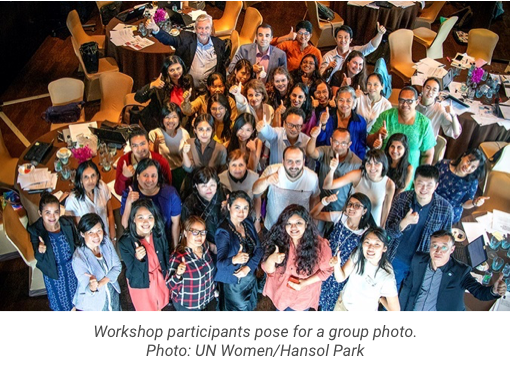
I never even heard of “data waste,” so I definitely didn’t know this was something to fight against. But according to my co-facilitators at UN Women’s recent training in Bangkok, fight it we must if we are ever going to track progress (or lack thereof) for the world’s women and girls. How can we hold governments accountable if we don’t have the data or if it is misunderstood? How can we use data strategically to amplify compelling human stories? Data often raises questions that demand answers: Why is child marriage in Nepal increasing? How is it that only 2% of employers in Armenia are women? Why are maternal deaths so high in rural areas of the Philippines?
25 dynamic participants from 8 countries in the Asia-Pacific region made up teams of national statistical officials, journalists, policymakers, and advocates with the shared goal of producing gender data in an understandable, useable, and accessible way. My role was to help them learn new communications techniques and how to create a strategic communications plan to ensure that the data they produced informs the right people.
Sadly, there is a lot of “data waste.” Important stories are often buried under an avalanche of statistics and hidden sometimes in plain sight. One dissemination “plan” we heard about consisted of simply posting a major national comparative report on a website with no push to expand awareness of the findings. A missed opportunity for engagement.
Over the three days, I coached participants to develop an actionable strategy for their home countries and helped them learn how to work effectively with journalists. Participating teams were able to present their strategies to their colleagues on the third day of the training.
Other trainers taught data visualization techniques and provided data users with a better understanding of statistics and their uses. Only time will tell, but I think we made a dent in the data waste problem.